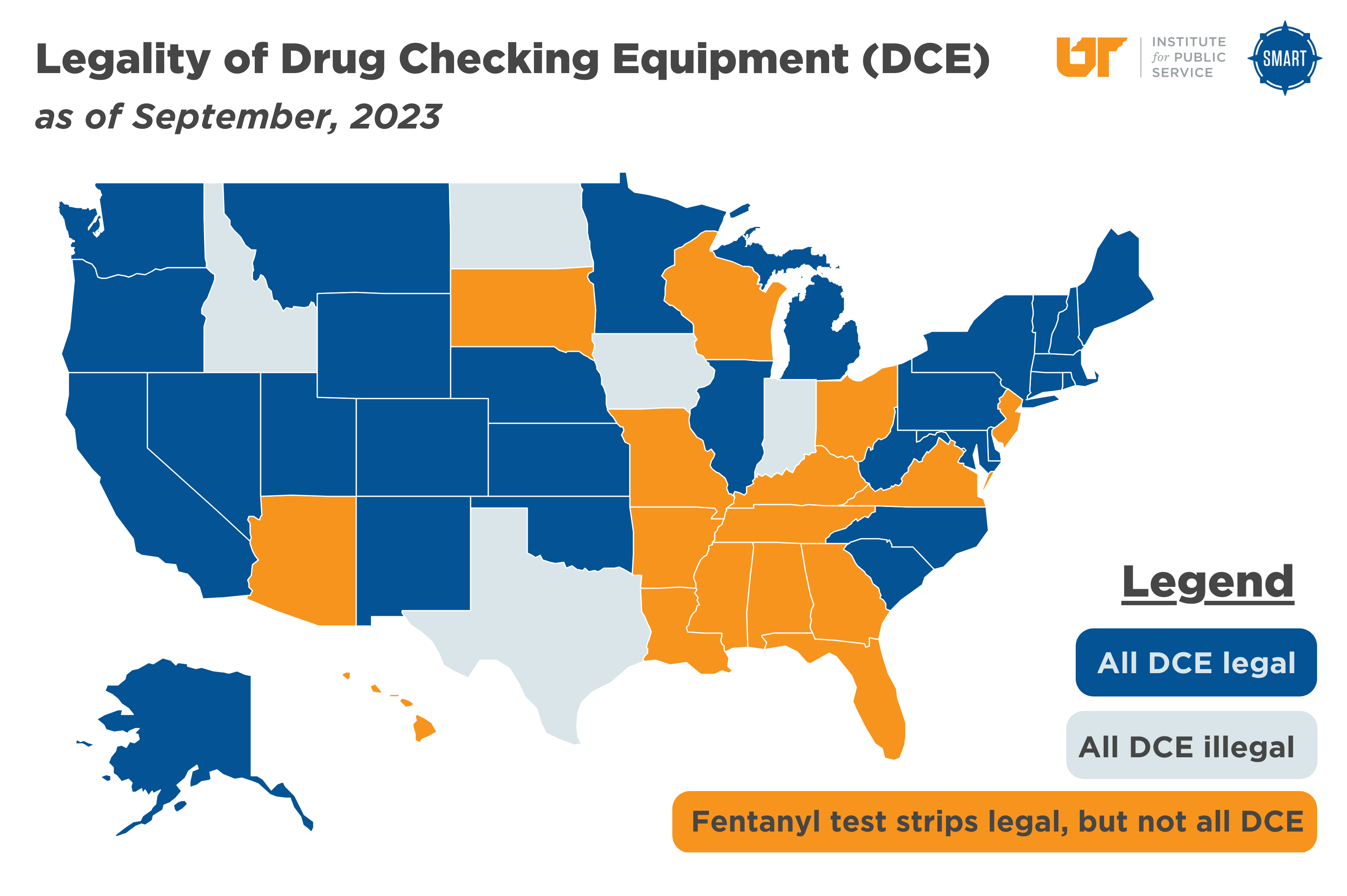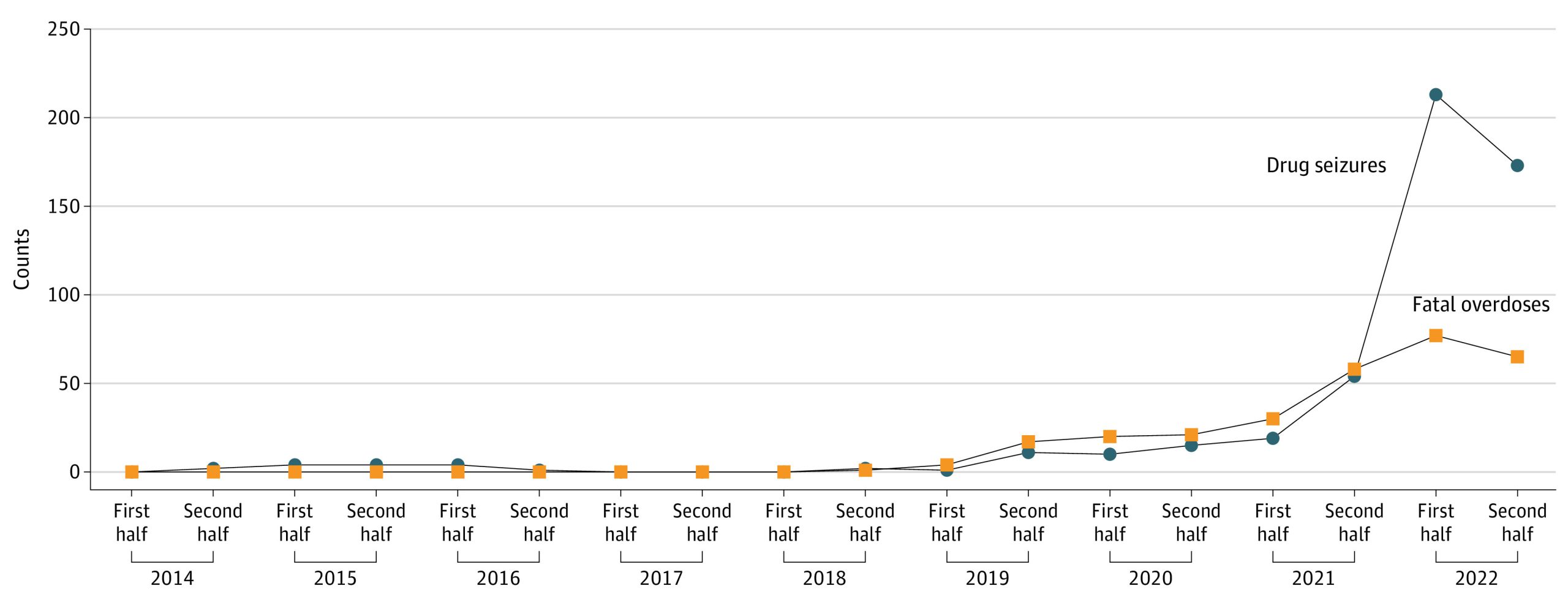Beyond Fentanyl Test Strips: The Need to Decriminalize All Drug Checking Equipment in Tennessee
Key Points
|
Impact of Fentanyl Test Strip (FTS) Decriminalization in Tennessee
The Tennessee Department of Mental Health and Substance Abuse Services (TDMHSAS) estimates that it has distributed over 126,000 FTS between July 2022 and June 2023. In the first year of this effort, the department collected voluntary data submissions from people who used the test strips. Some of their key findings were:
- 83% reported that some or all of their FTS tested positive for fentanyl.
- 51% of the substances tested were methamphetamine.
- 85% reported at least one positive behavior change (such as reducing the dose they intended to take, acquiring naloxone, or changing the method of drug use (i.e., snorting instead of injecting).
- 94% reported feeling better prepared to protect themselves from an overdose with FTS.
This survey will soon be expanded to also include xylazine so that this public health data can be used to help estimate how frequently xylazine test strip results are positive.
Across the U.S. and abroad, drug-checking equipment (DCE) have been found to be consistently associated with positive attitude change, in particular the reported decision not to use the tested substance in question. This was especially the case when the substance tested positive for fentanyl or when in general the results were not what the user expected. Actual behavior changes beyond reported attitude change were also positively associated with the use of DCE, but the effect size was more variable. For example, attendees at a Canadian music festival were more likely to discard their substances altogether when they tested positive for fentanyl. It would be informative to see if such findings could be replicated in Tennessee, where the music industry is a significant portion of the state economy.
On the other hand, participants in a Canadian supervised injection site that received positive test results on their substances proceeded to use the tested substance while mitigating the risk by way of administering the substance more slowly or in smaller doses. It is worth clarifying, though, that the very nature of supervised injection facilities, which employ trained overdose prevention personnel on-site with naloxone at hand, adds a critical context to those findings. In any case, Tennessee does not permit supervised injection sites.
Syringe service programs (SSPs) have been crucial points of contact for the distribution of FTS in Tennessee, as well as naloxone, educational resources, wound care kits, and other services including HIV testing, referral to treatment, and more. Importantly, people who utilize SSP services are five times more likely to enter into addiction treatment. A needs assessment sponsored by the Tennessee Department of Health (TDH) and conducted in 2022 by East Tennessee State University Addiction Science Center (ETSU ASC) found that people who use drugs have had consistently positive experiences with SSPs, and importantly, that FTS distributed through SSPs had been used to identify fentanyl and save lives because people were unaware that their drugs contained the powerful synthetic opioid.
A survey conducted by the SMART Initiative in 2023 found similar results as TDMHSAS and ETSU ASC regarding FTS. We interviewed people who use drugs and engaged with harm reduction services in either a rural SSP in Claiborne County or with the Regional Overdose Prevention Specialists in Knox County. We found that 89% reported that they would use FTS if they were provided, and 88% would take additional precautions to avoid overdose if their drugs tested positive for fentanyl.
Of those who would use the drug after a positive test, the vast majority indicated they would take additional precautions to prevent overdose. The most common precautions identified were to ensure that naloxone was immediately available, taking a lower dose of the drug in question, and contacting a friend to inform them they were about to use the drug in question (and the same percentage said they would only use the drug if a friend was present). 24% of the respondents reported that they would discard the substance that tested positive for fentanyl altogether, and a few also mentioned that it would make them consider entering into long term recovery.

We also found some interesting differences between those who regularly use amphetamines and those who regularly use opioids (factoring out other substances such as alcohol, cannabis, etc.).
Those who used both amphetamines and opioids had responses in line with those using regularly amphetamines, so it is easy to break them into two categories: those who use amphetamines and those who do not. Notably, 100% of the people who reported using amphetamines regularly or a combination of amphetamines and opioids reported that they would take additional precautions to avoid overdose.
Those who regularly used opioids were less likely to take additional precautions, but the majority still indicated that they would. Even more important was the fact that overall, only 12% of respondents said they would NOT take additional precautions if their drugs tested positive for fentanyl.
FTS are just one tool in the harm reduction toolkit. When paired with naloxone distribution, education, and access to treatment, people who use drugs have been found to be more likely to reduce dangerous drug use behaviors and thus the likelihood of a fatal overdose, extending the time that they will stay alive and potentially enter long-term recovery.
Drug Checking Equipment Decriminalization in Other States

Most states have decriminalized drug checking equipment to some extent, with fentanyl test strip legalization being the most common and widely adopted policy. As of the end of 2023, 29 states and D.C. allow access to all DCE.
West Virginia took one of the most recent actions on Feb. 2, 2024, when Governor Jim Justice signed into law Senate Bill 269, permanently removing all drug testing strips from the definition of drug paraphernalia.
This West Virginia bill repealed a 2022 bill that, like Tennessee, only excluded FTS from that definition. The reasoning behind this policy was that drug trends are constantly changing, so it was more efficient to decriminalize all kinds of drug testing strips preemptively. As Republican Deputy House Speaker Matthew Rohrbach said on the House floor shortly before the bill passed with an overwhelming majority, “as time has gone, unfortunately, we’ve got fentanyl, now we’ve got carfentanil, now we’ve got xylazine.”
Drug Trends Change Faster Than Laws
Fentanyl and other synthetic opioids are currently the main drivers of overdose fatalities, but this was not the case until about 10 years ago, and it may not be the case in the future. Consider xylazine, referenced by Rohrbach in his argument in favor of decriminalizing all testing strips. Xylazine, also known as “tranq,” is a non-opioid anesthetic that is often mixed into the fentanyl supply or even sold independently. It was essentially unheard of in Tennessee until the second half of 2019, when the rate of fatal overdoses involving xylazine sharply increased by 352%. Below is a graph reprinted from Korona-Bailey et al., 2023, which charts such overdoses against seizures of xylazine by law enforcement:

This study found that there were 324 xylazine-involved deaths from 2019-2022. Separately, the Tennessee Bureau of Investigation announced that the trend has continued to worsen, estimating that there were 564 additional cases involving xylazine in 2023 alone. The Drug Enforcement Administration reports that in 2022, xylazine was detected in approximately 23% of fentanyl powder and 7% of all fentanyl pills seized nationally. Tennessee is no exception: the Metro Nashville Police Department detected xylazine alongside fentanyl in a seizure of over 120,000 counterfeit pain pills in early 2024.
Testing for xylazine at the forensic level is becoming more common. For example, the East Tennessee Regional Forensic Center tests for xylazine in expanded panel toxicology screenings for the 23 counties it serves. Outpatient testing facilities such as Nashville’s Aegis Sciences Corporation also increasingly screen for xylazine. SSPs, recovery community centers, harm reduction organizations, and other overdose prevention organizations – which often already provide FTS – present an opportunity to spread testing capacity at the user level by distributing xylazine test strips (XTS).
XTS are currently legal in Tennessee, but this is only because xylazine is not currently a controlled substance, and the Tennessee law regulating DCE is specifically dependent upon the substance in question being controlled. Congress has attempted to schedule xylazine before, however, and should they succeed in doing so, XTS would immediately be classified as drug paraphernalia and would thus be illegal in Tennessee. As xylazine is not a synthetic opioid, the bill that exempts FTS from the definition of paraphernalia would not apply. Kratom is another such drug that could face this situation: any strips designed to test for it would be illegal should kratom be scheduled as a controlled substance.
Such a scenario is not impossible to imagine. For example, bromazolam and other so-called designer benzodiazepines have been surging in the drug supply in recent years, contributing to a rising number of overdose fatalities in Tennessee and other states, and late last year the DEA temporarily scheduled five of them. Because these drugs are controlled substances but not synthetic opioids, testing strips designed to detect benzodiazepines are considered drug paraphernalia and are thus illegal in Tennessee.
“Fentanyl test strips and xylazine test strips absolutely provide important information for the consumer as well as the community at large (we provide both). Decriminalizing any and all drug-checking tools/equipment would be not only beneficial but lifesaving for our participants. Hearing from our participants about the changing, unpredictable, and often lethal drug supply is the most reliable source of information we have.
Any and all additional information about what’s in the supply is useful for harm reductionists—although our goal will still be to transmit that information as quickly and efficiently as possible to participants.”
- Genoa Clark, MPPA, Director of Harm Reduction, Choice Health Network
Decriminalization of All Drug Checking Equipment Enhances Responsiveness to Emerging Drug Trends
FTS have been demonstrated to meaningfully change behaviors related to drug use, and they are an effective, affordable tool for prevention and harm reduction organizations. Preliminary data from 2023 show that fatal overdose deaths declined slightly from 2022, and most of the change comes from a reduction in deaths involving fentanyl. In addition to increased access to naloxone, SSPs, and other services, FTS may have contributed to this reduction in fatal overdose deaths.
FTS and other drug checking equipment may also shed light on drug trends, detecting the presence of fentanyl or xylazine on the street before such data shows up in toxicology reports. By extending testing to the user level, stakeholders in the fight against the overdose crisis might be made aware of the presence of fentanyl or xylazine or other substances in the drug supply, as opposed to waiting for an autopsy report to reveal that presence long after a person or people have died. It is highly likely that new drugs will cause fatalities in the future, and future methods to detect those drugs could be classified as drug paraphernalia under current Tennessee law.
By decriminalizing all drug checking equipment, particularly user-friendly test strips, there would be no government barrier for this impactful tool of detection, prevention, and harm reduction. The Legislative Analysis and Public Policy Association has released model legislation to decriminalize all DCE. This may be useful to policymakers considering enacting such a law in Tennessee.
Policy Brief Authors:
Jeremy C. Kourvelas, MPH, UT SMART Initiative
Marissa Kluk, MPH, CPRS, ETSU Addiction Science Center
Angela Hagaman, DrPH, ETSU Addiction Science Center
